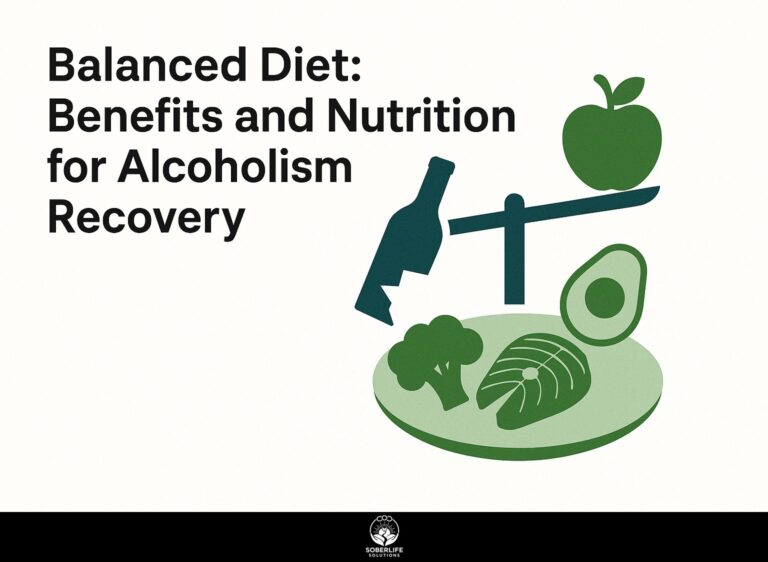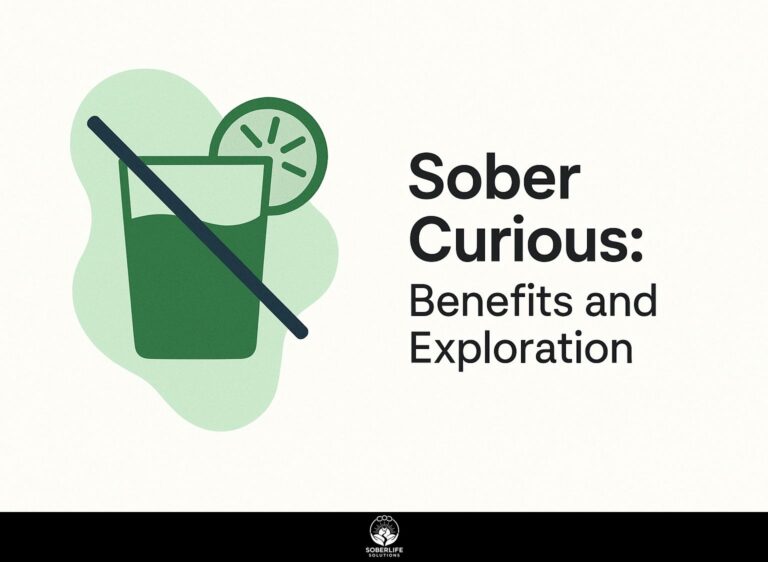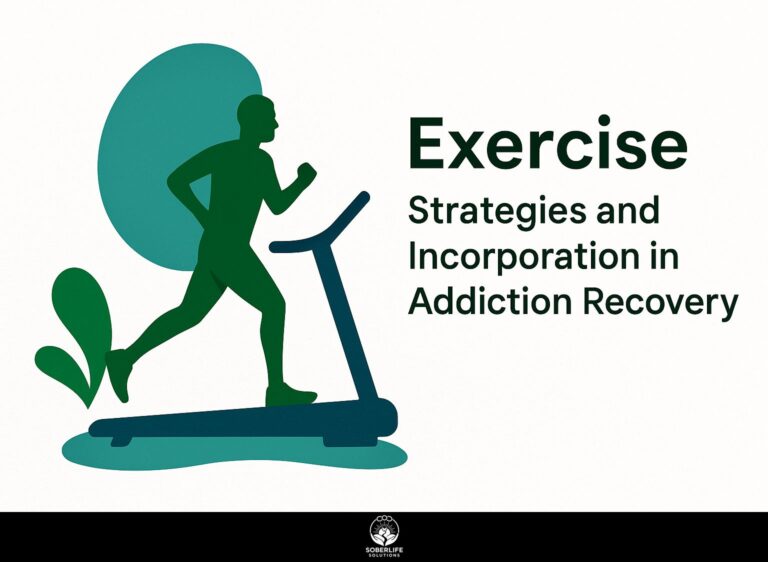Spiritual Fulfillment in Alcoholism Recovery
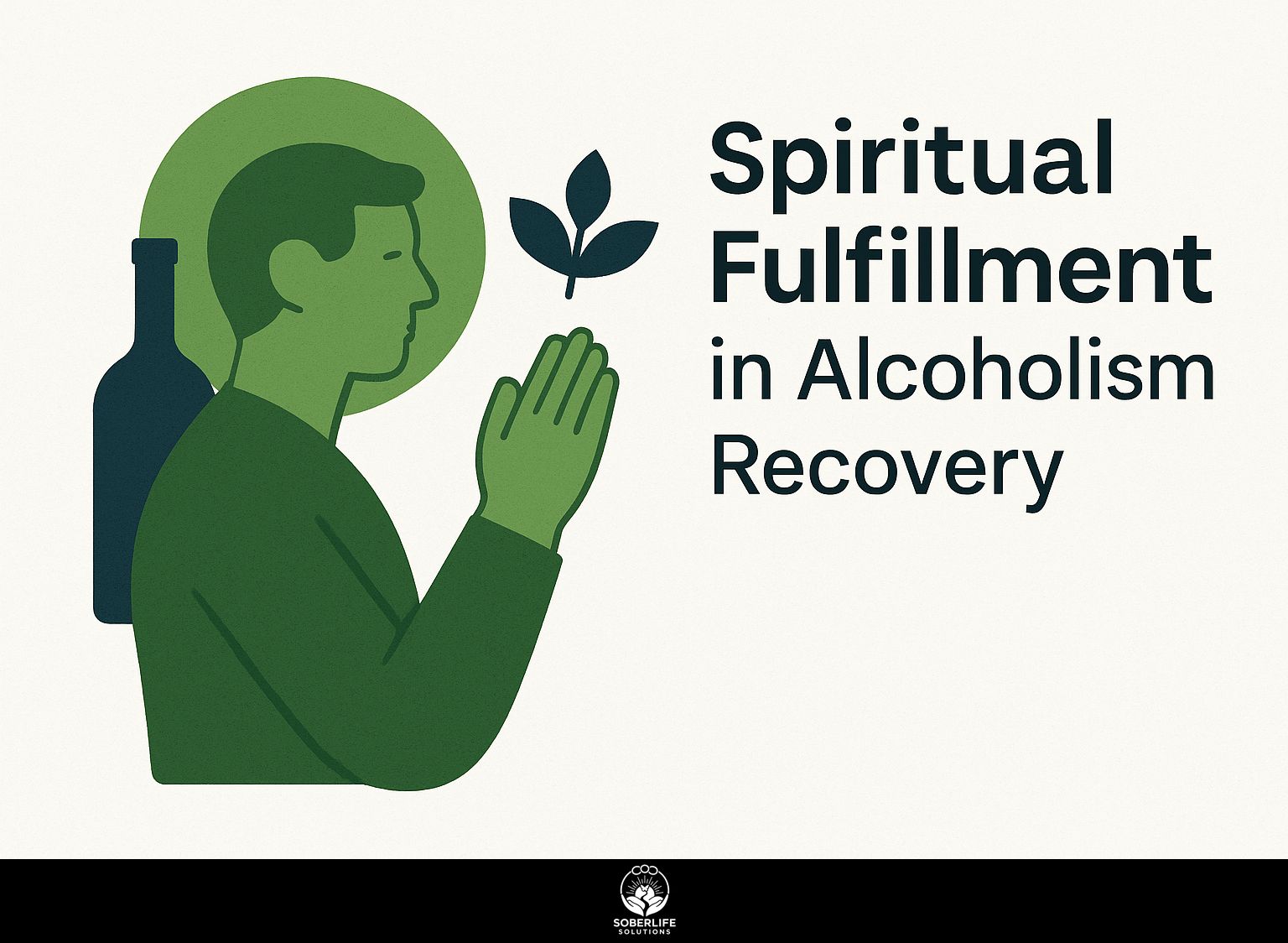
During addiction recovery, spirituality can be an important part for creating lasting change. Many people in Alcoholics Anonymous find that connecting with a higher power helps them heal emotionally and grow personally. This article looks at how spiritual fulfillment can improve your recovery experience, providing ideas on practices that help strengthen resilience and community. Use spirituality as a key part of overcoming the difficulties of recovering from alcoholism.
Key Takeaways:
The Role of Spirituality in Alcoholism Recovery
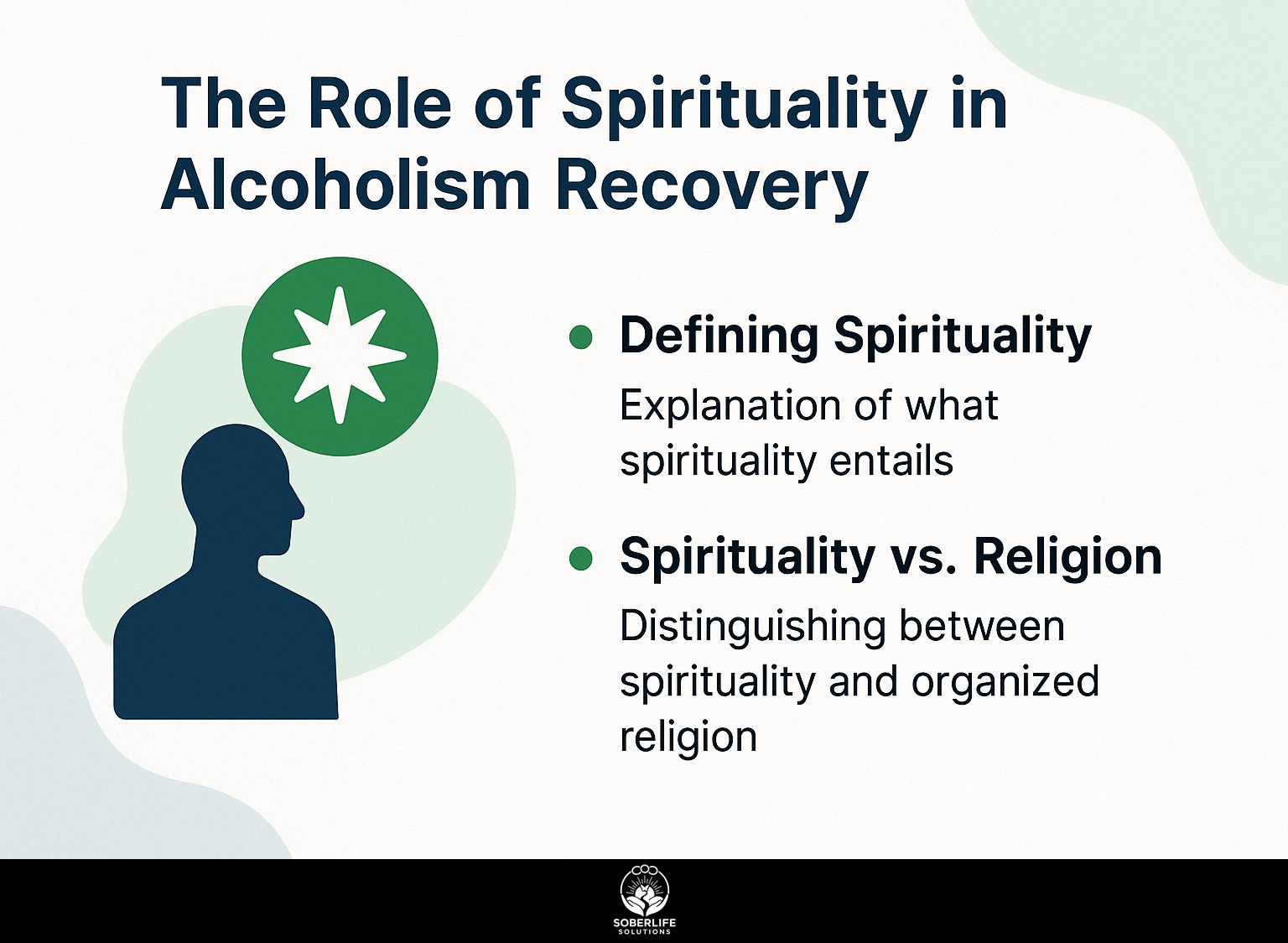
Spirituality is important in recovering from alcoholism. It often helps people engage with a higher power, which is a key part of programs like Alcoholics Anonymous. According to research published in MDPI, the concepts of meaning in life and hope significantly contribute to the duration of abstinence, underscoring the role of spiritual engagement in recovery. For those exploring deeper aspects of recovery, our insight into spiritual health highlights its purpose and meaning in fostering lasting change.
Defining Spirituality
Spirituality is often described as a belief system that encourages personal development, emotional recovery, and a sense of purpose, separate from traditional religion.
This flexibility lets people understand spirituality in ways that connect with their personal experiences.
For example, someone in recovery might find spirituality through:
- Nature
- Practicing mindfulness during daily walks
- Engaging in meditation
Some people may join support groups, where sharing stories can help with healing. Tools like meditation apps or spiritual books can improve one’s path, as can creative outlets like journaling, which help clarify personal beliefs.
Spirituality adapts to fit each person’s path to happiness and health.
Spirituality vs. Religion
Spirituality involves personal beliefs and practices, while religion usually follows set rules, which might connect with people in recovery or might not.
For many in recovery, spirituality offers a flexible, personal approach. It may involve practices such as meditation, journaling, or connecting with nature.
For example, a person might feel more confident by saying positive statements to themselves every day or doing exercises that help them concentrate, creating a personal spiritual practice that fits their needs. Conversely, traditional religious paths provide community support and structured rituals.
A person might attend weekly services or engage in prayer, finding comfort in shared beliefs and faith-based support systems. (For those interested in structured detox, [faith-based programs](https://soberlifesolutions.com/faith-based-detox-benefits/) provide unique benefits.)
The decision to choose spirituality or religion is based on personal preferences and how one wants to heal. This aligns with perspectives from Medium’s analysis that discusses the nuances of spirituality versus religion.
Benefits of Spiritual Fulfillment
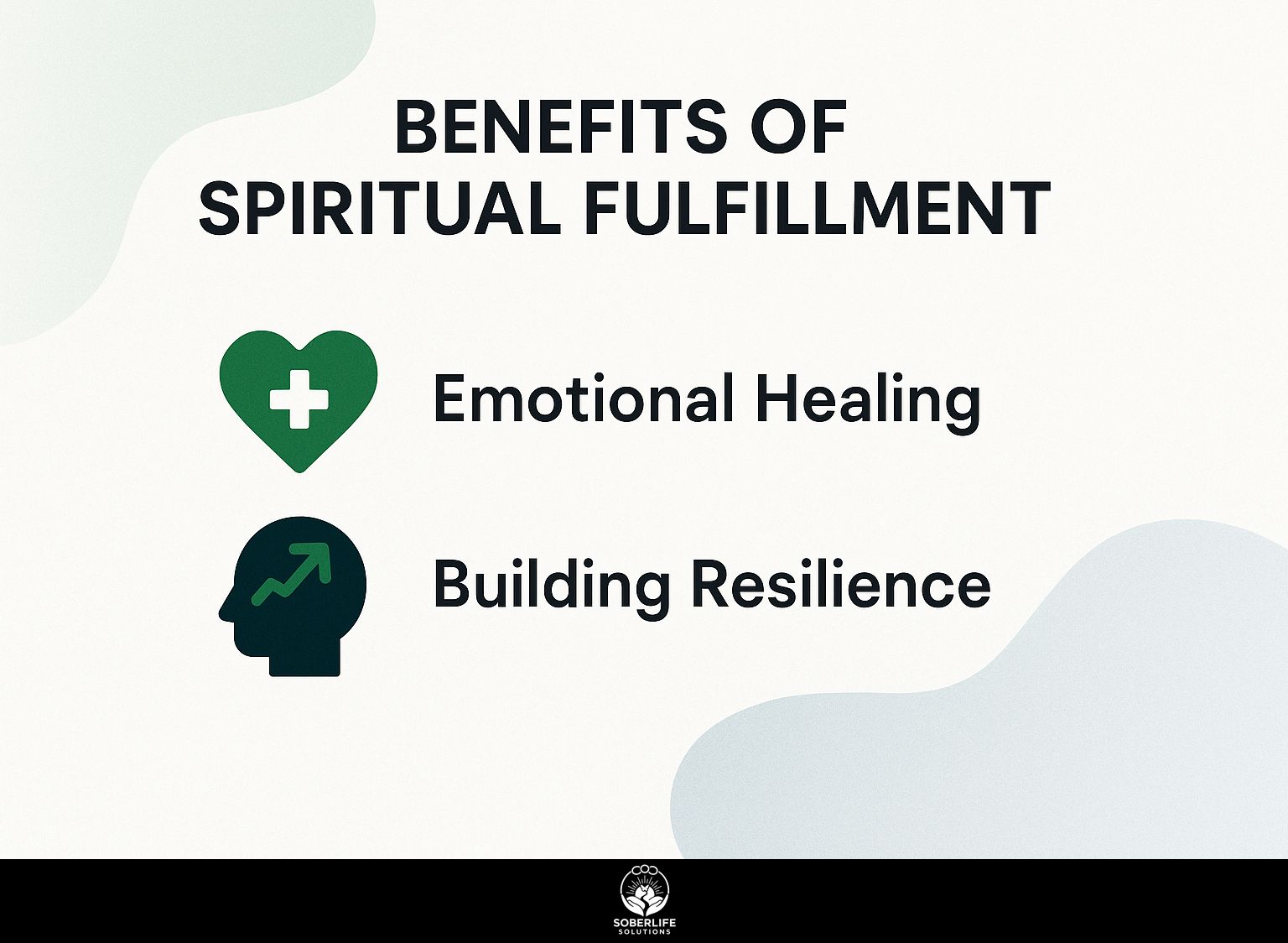
Spiritual fulfillment can offer significant benefits to people in recovery, such as better emotional healing and stronger coping skills, eventually leading to a richer life.
Emotional Healing
Practicing spiritual activities helps people heal emotionally, forgive themselves and others, and find inner peace.
One effective method for emotional healing is the practice of forgiveness rituals. Think about writing a letter to someone you need to forgive, even if you don’t send it. This allows you to articulate your feelings and release pent-up emotions.
Incorporating a daily gratitude practice can shift your mindset; jot down three things you are thankful for each morning.
Stories from people who have tried these methods show significant changes, demonstrating how spiritual approaches can provide real emotional comfort.
Building Resilience
Spiritual fulfillment strengthens people by giving them the tools needed to handle life’s difficulties during recovery.
Activities like mindfulness therapy and nature art can greatly improve emotional resilience.
Mindfulness therapy, which involves techniques like meditation and deep breathing, helps individuals stay present and manage stress effectively. Research by the American Psychological Association highlights the benefits of techniques like mindfulness meditation in reducing stress and improving mental health. You can explore more on these findings through their mindfulness meditation resource.
In parallel, nature art-creating art using natural materials-promotes healing and self-expression. For example, participants might collect leaves and stones to create a piece that illustrates their personal experience.
Adding these activities to your daily schedule can help you feel more in touch with your inner self and offer a peaceful space during difficult times.
Spiritual Practices for Recovery
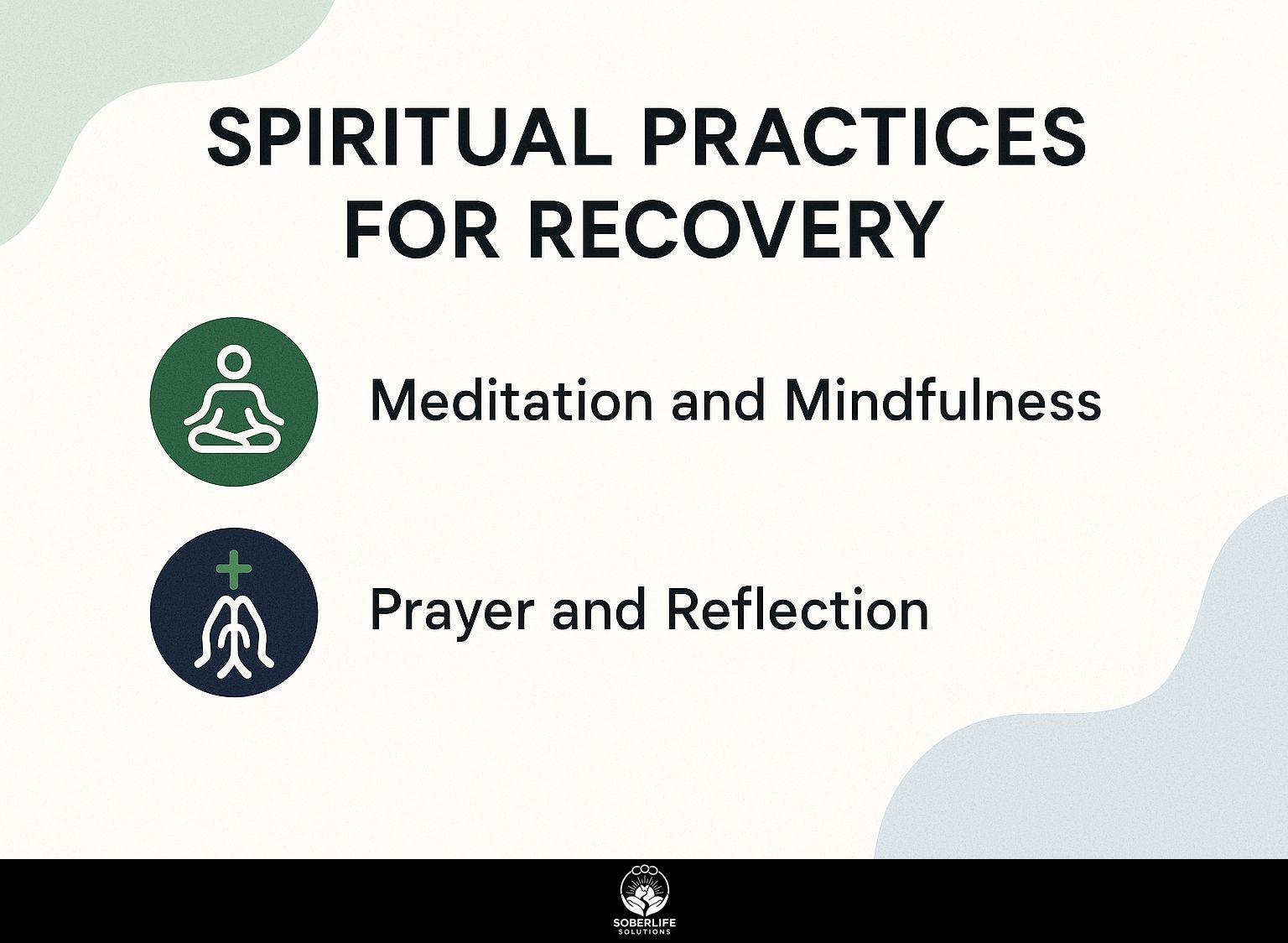
Using spiritual practices like meditation and prayer can greatly improve recovery. These methods provide ways to manage emotions and connect with one’s higher power. Related insight: Curious about how different recovery frameworks, such as LifeRing and Recovery Dharma, incorporate these principles? Explore how they apply spiritual concepts to enhance recovery processes.
Meditation and Mindfulness
Practicing meditation and mindfulness regularly can lower anxiety by up to 40%, helping people in their recovery process.
To add meditation and mindfulness to your daily habits, begin with five minutes each day. Use the Headspace app, which provides guided sessions specifically designed for beginners.
Sit in a comfortable position, close your eyes, and focus on your breath-inhale for four counts, hold for seven, then exhale for eight. Progressively increase your meditation duration as you feel more comfortable.
Try using mindfulness methods, such as focused breathing while doing everyday tasks, to improve your attention and calmness all day.
Prayer and Reflection
Prayer and thoughtful contemplation are strong practices that can increase spiritual awareness, providing daily opportunities for gratitude and self-awareness.
Writing in a prayer journal can improve these practices. People can write down their thoughts, prayers, and personal reflections, creating a physical record of their spiritual experiences.
Another great method is to use guided meditations focused on themes like forgiveness or gratitude, which can help with deeper self-reflection.
Spending a few minutes each day in quiet reflection can help you feel more present and connected with your faith.
Using these methods together can really support personal growth and learning.
Community and Support in Spiritual Growth
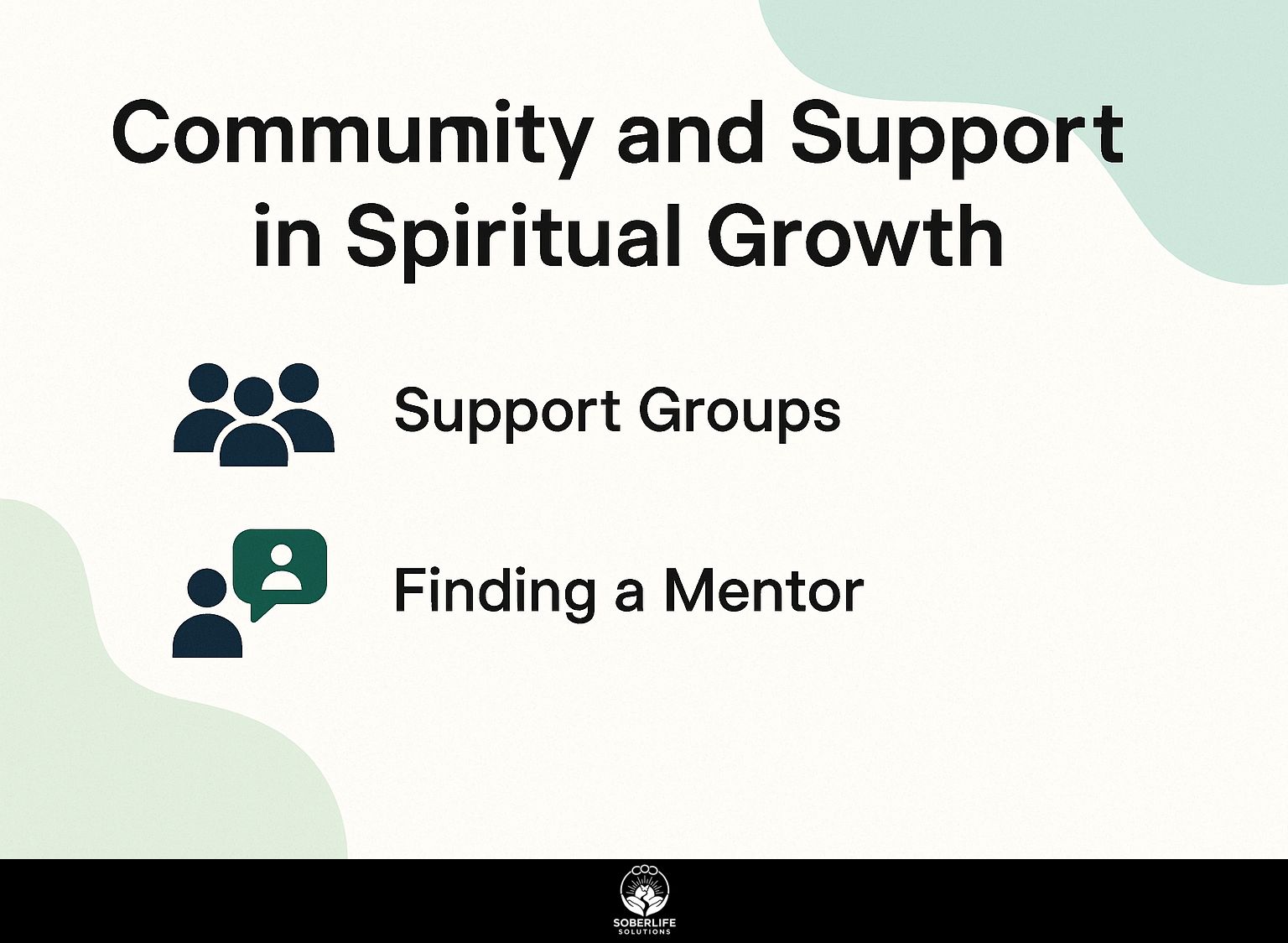
A supportive spiritual group offers important help, guiding people through their recovery process with shared experiences and responsibility. Worth exploring: sober support systems that help enhance these group dynamics, providing additional resources and frameworks for successful recovery.
Support Groups
Support groups like Alcoholics Anonymous use spiritual principles to encourage responsibility and provide emotional support to members.
These groups promote shared experiences, significantly aiding recovery. Research indicates that participants in support groups report a 50-70% success rate in maintaining sobriety after one year, compared to only 30% for those who don’t engage in similar programs.
Personal stories illustrate this impact; many individuals recount how the fellowship and shared prayer helped them confront their challenges.
To improve participation, use tools like online meeting platforms (Zoom) for easier access and promote a buddy system to build relationships and responsibility.
Finding a Mentor
Having a mentor in recovery can give you individual advice and help, greatly improving your spiritual growth and learning.
To find a good mentor, choose someone who has a lot of recovery experience, can understand others’ feelings, and is open to sharing their own experiences.
Find mentors in recovery groups by visiting local support meetings, joining online discussions, or using recovery apps like Sober Grid or I Am Sober.
Attend meetings where potential mentors may congregate, and observe their interactions to gauge their suitability. By engaging in conversations, you can better assess whether their approach aligns with your recovery goals and values.
Challenges in Integrating Spirituality
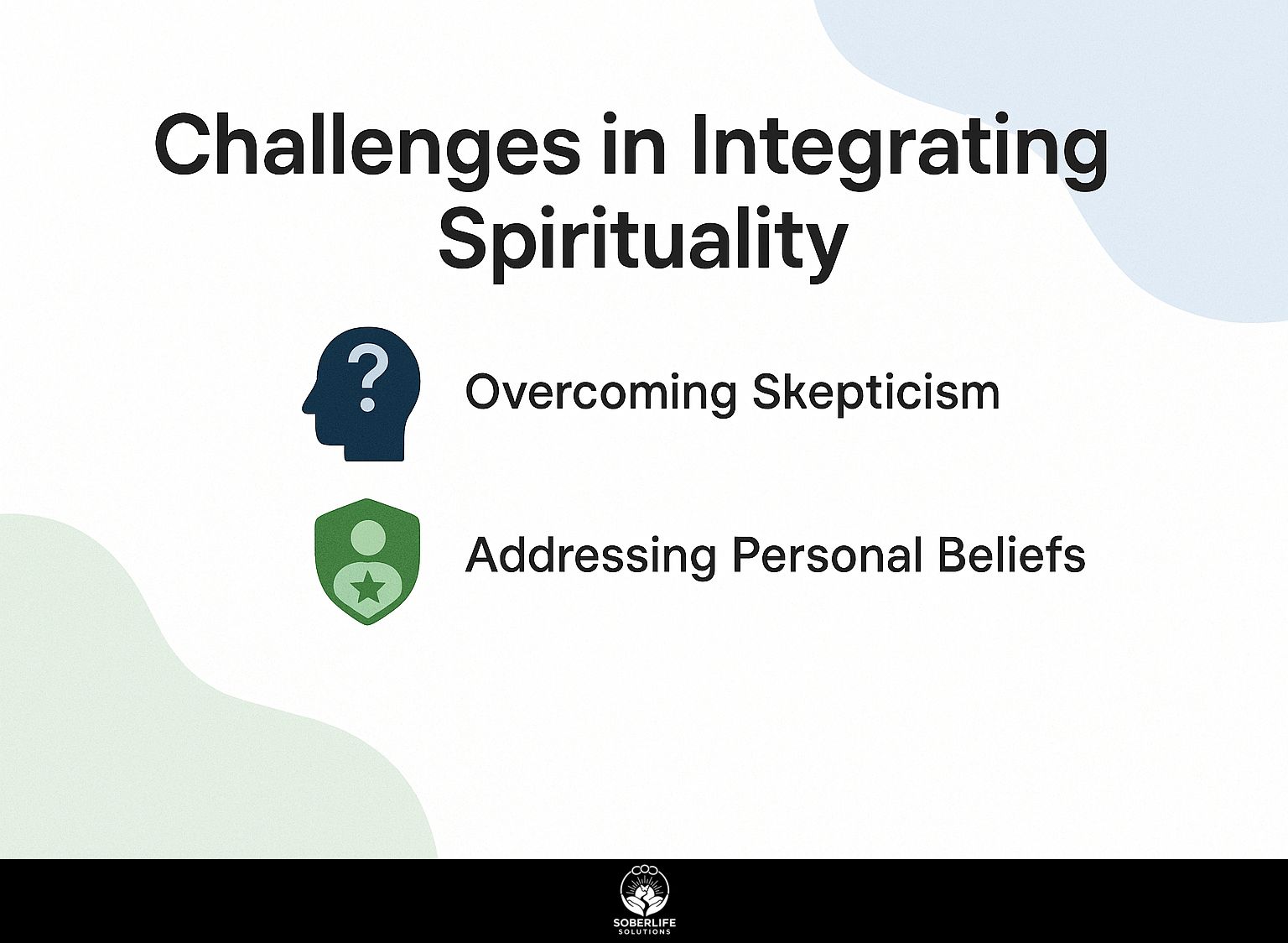
Adding spirituality to recovery can be difficult because some people may doubt its value or have different personal beliefs.
These issues need to be tackled for recovery to work well.
Overcoming Skepticism
Getting past doubts about spirituality is important because they can prevent someone from using helpful recovery methods that promote healing.
To address skepticism, start with small, personal spiritual practices, such as daily meditation or gratitude journaling.
For instance, setting aside just five minutes each morning for mindfulness can gradually shift perceptions.
Consider reading testimonials from others who initially doubted spirituality, like:
- Sarah, who found peace through guided meditation,
- Mark, who found help through local spiritual groups.
Regularly doing these activities can improve self-awareness and help develop a stronger sense of spirituality over time.
Addressing Personal Beliefs
Dealing with personal beliefs and spiritual practices is important for staying true to oneself during recovery.
To understand and combine your beliefs, begin by writing in a journal about your thoughts on spirituality compared to personal beliefs. Allocate at least 10 minutes daily for this reflection.
Ask yourself questions like:
- What do I believe about the universe?
- How do these beliefs align or conflict with my spiritual practices?
Try using meditation apps like Insight Timer to support your meditation routine. Joining a discussion group or community can improve your knowledge and offer support, helping to clarify your beliefs and strengthen your spiritual path.
Frequently Asked Questions
What is spiritual fulfillment in alcoholism recovery?
Spiritual fulfillment in alcoholism recovery means finding purpose, meaning, and a connection to something bigger during recovery from alcohol addiction. It involves developing a spiritual or religious practice, connecting with others who share similar beliefs, and finding inner peace and contentment.
How does spiritual fulfillment aid in alcoholism recovery?
Finding spiritual fulfillment can offer hope, encouragement, and resilience while overcoming alcoholism. It can serve as a source of support, guidance, and healing for individuals struggling with addiction. It can also help individuals find a sense of purpose and fulfillment in life, which can aid in maintaining sobriety.
What are some spiritual practices that can be helpful in alcoholism recovery?
There are many spiritual practices that can be beneficial for individuals in alcoholism recovery, such as meditation, prayer, journaling, participating in religious services or ceremonies, and connecting with a higher power or spiritual community. These practices can help individuals develop a deeper sense of self-awareness, cope with difficult emotions, and find inner peace.
Do I have to be religious to experience spiritual fulfillment in alcoholism recovery?
No, spiritual fulfillment in alcoholism recovery does not necessarily have to be tied to a specific religion or belief system. It can include connecting with a higher power as you see it, creating a personal spiritual routine, or finding purpose and connection with other people. It is a personal process and can vary for each person.
How can I include spiritual satisfaction in my recovery from alcoholism?
There are many ways to bring spiritual fulfillment into alcoholism recovery, such as going to religious or spiritual services, meditating or praying, reading spiritual books, journaling, or joining support groups with a spiritual focus. It is important to find what works best for you and to be open to exploring different practices.
Can spiritual fulfillment help prevent relapse in alcoholism recovery?
Yes, spiritual fulfillment can play a significant role in preventing relapse in alcoholism recovery. It can provide individuals with a sense of purpose, support, and coping mechanisms for dealing with stress and difficult emotions. It can also help individuals develop a strong connection to their values and beliefs, which can serve as motivation for maintaining sobriety.

